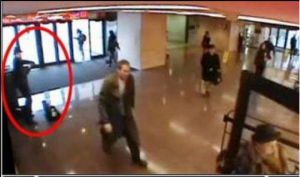“Living is easy with eyes closed; misunderstanding all you see.” ~John Lennon
“People only see what they are prepared to see.” ~Ralph Waldo Emerson
People today seem to be very preoccupied with a reality that only exists within their own minds, which causes cognitive blindness. In a way, that also makes people fail to perceive the reality that actually exists around them and causes a lack of appreciation of people, life and reality. We miss opportunities and don’t even realize it. Instead of being concerned about the reality or time that iss ‘now,’ we limit our minds by our own ideas and pre-occupy ourselves with the past and the future. Take for instance, if you’re looking for that perfect partner, you will fail to recognize him or her even if that person was standing right in front of you, especially if that person is rare. Not only is being rare valuable, but it also becomes unrecognizable. And all due to the preconceived and self imposed limits we have placed on our own minds. Your perception about a thing is what creates your idea about it. For example, Walt Disney was fired from a newspaper for “lacking imagination” and “having no original ideas.” The Beatles were rejected by Decca Recording Studios, who said “We don’t like their sound, they have no future in show business.” Albert Einstein’s school teachers believed he was mentally slow and said “He would never amount to much.” These beliefs came to be by the self imposed ideas while simultaneously being preoccupied with a limited reality within their own minds. The eyes and ears cannot see or hear what the mind is not ready to understand. Would you be able to recognize greatness if it was standing beside you?
The story below, written by Josh Nonnenmoc, is another great example on this topic.
“A man sat at a metro station in Washington DC and started to play the violin; it was a cold January morning. He played six Bach pieces for about 45 minutes. During that time, since it was rush hour, it was calculated that 1,100 people went through the station, most of them on their way to work.
Three minutes went by, and a middle aged man noticed there was musician playing. He slowed his pace, and stopped for a few seconds, and then hurried up to meet his schedule.
A minute later, the violinist received his first dollar tip: a woman threw the money in the till and without stopping, and continued to walk.
A few minutes later, someone leaned against the wall to listen to him, but the man looked at his watch and started to walk again. Clearly he was late for work.
The one who paid the most attention was a 3 year old boy. His mother tagged him along, hurried, but the kid stopped to look at the violinist. Finally, the mother pushed hard, and the child continued to walk, turning his head all the time. This action was repeated by several other children. All the parents, without exception, forced them to move on.
In the 45 minutes the musician played, only 6 people stopped and stayed for a while. About 20 gave him money, but continued to walk their normal pace. He collected $32. When he finished playing and silence took over, no one noticed it. No one applauded, nor was there any recognition.
No one knew this, but the violinist was Joshua Bell, one of the most talented musicians in the world. He had just played one of the most intricate pieces ever written, on a violin worth $3.5 million dollars.
http://youtu.be/myq8upzJDJc
Two days before his playing in the subway, Joshua Bell sold out at a theater in Boston where the seats averaged $100.
This is a real story. Joshua Bell playing incognito in the metro station was organized by the Washington Post as part of a social experiment about perception, taste, and priorities of people. The outlines were: in a commonplace environment at an inappropriate hour: Do we perceive beauty? Do we stop to appreciate it? Do we recognize the talent in an unexpected context?
One of the possible conclusions from this experience could be:
If we do not have a moment to stop and listen to one of the best musicians in the world playing the best music ever written, how many other things are we missing?”
“There are things known and there are things unknown, and in between are the doors of perception.” ~Aldous Huxley
Open Your Minds…

